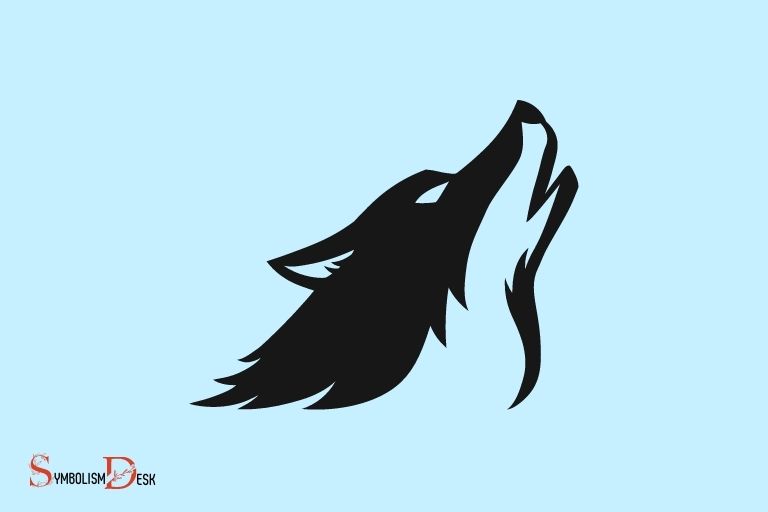What Does the Symbol of a Wolf Mean? Strength!
The symbol of a wolf is often associated with loyalty, courage, strength, and independence. In many cultures, the wolf is seen as a powerful and wise creature.
The symbol of a wolf can also represent a deep connection with instincts and intuition, often embodying a warrior spirit.
The symbol of a wolf has been used for centuries in various cultures and civilizations. In Roman mythology, the wolf is linked to Mars, the god of war and agriculture.
Similarly, in Norse mythology, wolves were seen as powerful creatures to be respected.
In Native American cultures, the wolf is often seen as a teacher or pathfinder, guiding us to understand ourselves and the world around us.
Overall, the symbol of a wolf is a powerful emblem that encapsulates several desirable traits.
Whether it’s the loyalty to their packs, the strength and courage they display, or the deep-seated instincts they follow, the wolf is a rich symbol of dignity and power.
Thus, it has become a popular and respected symbol in various cultures and contexts.
10 Cultures: Symbolisms of a Wolf
| Culture/Tradition | Symbolism of a Wolf |
|---|---|
| Native American | Strength, Loyalty, Spiritual Guidance |
| Celtic | Wisdom, Cunning, Transformation |
| Norse | Power, Ferocity, Survival |
| Japanese | Bonding, Kinship |
| Christianity | Satan, Evil |
| Greco-Roman | War, Chaos |
| Siberian | Courage, Persistence |
| Chinese | Guardianship, Divine |
| Turkish | Power, Domination |
| Western | Danger, Fear |
Key Takeaway

Five Facts About: Symbolic Meanings of Wolves
Historical Significance Of The Wolf Symbol
Throughout history, the wolf has been a strong symbol in different cultures worldwide.
The historical significance of this animal has been ingrained in our minds through myths, stories, and legends, creating a deep connection between humanity and the wolf.
Here we’ll explain the key points about the history of the wolf symbol, including its role in ancient mythologies from greece, rome, scandinavia, and native american cultures and how different communities interpreted it.
We’ll also look at the connection of the wolf symbol with power and strength, among other things.
The Role Of The Wolf In Ancient Mythologies – Greece, Rome, Scandinavia, And Native American Cultures
The wolf was a powerful symbol in ancient greek mythology, representing both destruction and redemption.
In rome, the wolf was the symbol of the founding legend of the city, romulus, and remus.
In scandinavian mythology, the wolf represented fenrir, a giant wolf that fought with odin during ragnarok, the end of the world.
Native american cultures celebrated the wolf for its intelligence, loyalty, and hunting skills. Some anthropologists even suggest that the wolf was the original dog, domesticated around 30,000 years ago.
How Different Communities Interpreted The Wolf Symbol
- In european cultures, the wolf was usually seen as a dangerous predator that threatened livestock and humans alike.
- In contrast, native american communities saw the wolf as a powerful ally, helper and guardian of their cultural values and spiritual beliefs.
- In tibetan buddhism, the wolf is associated with the wrathful deity yamantaka, who protects against the negative forces of death and destruction.
- Some ancient baltic tribes even worshipped the wolf as their ancestor or spirit god.
The Connection Of The Wolf Symbol With Power And Strength
- Wolves are known for their strength and agility, making them natural symbols of strength and power.
- The wolf has been historically depicted as a fierce and decisive hunter, a testament to its strength, speed, and adaptability.
- Due to their pack structure and hunting style, wolves also represent teamwork, cooperation, and loyalty.
- The wolf also has a deep spiritual meaning, including loyalty, intuition, and the ability to find your way in life.
The wolf symbol has been crucial in numerous cultures and enshrined in myths and legends throughout history.
The wolf symbol brings with it many interpretations and connotations, including strength, power, teamwork, and loyalty. Its significance to humans across the ages has never waned and continues to endure.
Contemporary Interpretation Of Wolf Symbolism
Understanding Why The Wolf Remains A Popular Symbol In Modern-Day Culture
Wolves are majestic creatures that have long been mythologized in different cultures. From native american tribes to modern-day urban legends, wolves have been featured prominently in stories and legends.
Here are some key points why they remain a popular symbol in contemporary times:
- The wolf stands for strength, loyalty, and family, making it an ideal symbol for those who want to promote these virtues.
- The wolf’s predatory nature and hunting prowess make it a symbol of primal instinct and survival. Many people find the wolf’s resilience and hunting skills admirable.
- Wolves live in packs and have a clear social hierarchy. They communicate with each other using body language, vocalizations, and pheromones, making them a great symbol for teamwork and communication.
How The Wolf Symbol Is Frequently Used Across Different Industries, Including Fashion, Art, And Sports
The wolf symbol has been utilized in a wide range of fields, from fashion to sports.
Here are some examples:
- In fashion, the wolf symbol is often used on t-shirts, sweatshirts, and other clothing items to convey a sense of rugged individualism and strength.
- In art, the wolf symbol has been used in everything from paintings to sculptures to convey a sense of power and grace.
- In sports, the wolf symbol has been used as a team mascot, representing strength, loyalty, and team spirit.
The Reasons Behind The Wolf’S Popularity In The Media And Pop Culture
The wolf is a popular symbol in the entertainment industry, appearing in movies, tv shows, and books.
Here are some reasons why:
- The wolf’s mystique and primal nature make it an exciting and compelling figure for writers and filmmakers to include in their work.
- The wolf is frequently used as a literary device to represent the untamed wilderness or the savage wildness within humans.
- The wolf’s pack mentality and close family ties make it a popular symbol for groups and families in many cultures.
Overall, the wolf symbol has endured across cultures and time periods thanks to its mixture of strength, loyalty, and primal instincts.
Its versatility allows for it to be used in different ways across different industries and art forms, ensuring its widespread popularity in contemporary culture.
The Psychology Behind Pack Mentality
The Characteristics Of The Wolf And Its Nature As A Social Animal
Wolves are fascinating creatures that have been feared and admired throughout history. They are known for their strength, endurance, and intelligence.
Wolves are social animals that live in packs, which can range in size from just a few individuals to more than 30.
The pack is led by an alpha male and alpha female, and each member of the pack has a particular role to play.
Some of the main characteristics of wolves include:
- Wolves are highly adaptable and can live in a wide range of habitats, from forests and mountains to the arctic tundra.
- They have sharp senses, particularly their sense of smell and hearing, which they use to hunt prey and communicate with each other.
- Wolves are apex predators, meaning they are at the top of the food chain in their ecosystem.
- They have a complex social hierarchy within the pack, with each member having a specific role to play, such as hunter, caregiver, or sentry.
Valuable Lessons Humans Can Learn From The Wolf’S Pack Mentality
The wolf’s pack mentality offers several valuable lessons for humans to learn from, including:
The importance of teamwork: Wolves work together as a team to hunt, care for their young, and protect their territory.
By working together, they are able to accomplish things they could not achieve alone.
Humans can also achieve more by working together as a team, whether in the workplace or in their personal lives.
The value of communication: Wolves communicate with each other through body language, vocalizations, and scent marking.
They have a complex system of communication that allows them to coordinate their actions and stay connected as a pack.
Humans can learn to communicate better by paying attention to nonverbal cues, listening actively, and expressing their thoughts clearly.
The importance of leadership: Wolves have a clear leader in their alpha male and alpha female.
These leaders are responsible for setting goals, making decisions, and guiding the pack.
In human groups, strong leadership can help to inspire and motivate members to work towards a common goal.
The benefits of cooperation: Wolves cooperate with each other to achieve shared goals, such as hunting down prey.
Cooperation can help humans to achieve success, too, whether by pooling resources or sharing knowledge and skills.
How The Wolf Symbol Is Often Associated With Strong Social Skills And A Strong Sense Of Community
The wolf symbol is often used to represent strong social skills and a strong sense of community. This is because of the wolf’s pack mentality and the traits it embodies.
Some of the reasons why the wolf symbol is associated with strong social skills and community include:
Wolves are loyal to their pack members and work together to achieve shared goals. This loyalty and cooperation are traits that humans value in their own communities.
Wolves have a complex social hierarchy with clear rules and roles. This structure helps to maintain order and ensure that everyone in the pack has a place and a purpose.
Similarly, in human communities, clear rules and roles can help to foster a sense of belonging and purpose.
Wolves communicate with each other regularly and effectively, which helps them to stay connected and coordinated.
This effective communication is something that humans also value in their own relationships and communities.
The Spiritual Connection To The Wolf Symbol
Analyzing The Spiritual And Metaphysical Significance Of The Wolf Symbol
The wolf holds a special place in many cultures and belief systems worldwide, representing a powerful symbolism of strength, loyalty, and spiritual wisdom.
Here are some key points in analyzing the spiritual and metaphysical significance of the wolf symbol:
In native american traditions, wolves are considered spirit animals that embody intelligence, loyalty, and a strong sense of family.
The wolf symbolizes the teacher who teaches the importance of strong relationships and the necessity of relying on one another for support.
The wolf represents a fierce and independent spirit which resonates with those who value leadership and strength of character.
The wolf symbolizes the courage to blaze your own trail in life, to forge ahead with confidence and conviction, and to stand your ground when needed.
In addition to its traditional symbolism, the wolf also represents a spiritual connection to the natural world.
Through its harmonious relationship with nature, the wolf teaches the importance of balance and unity.
This balance can be achieved through mindfulness and meditation practices, or simply by immersing oneself in nature.
Exploring The Power Of Intuition And Following One’S Instincts, Which The Wolf Symbolizes
It is said that the wolf is one of the most intuitive animals in nature, often relying on its powerful instincts to navigate through life.
The wolf’s powerful symbolism of intuition is a reminder of the importance of following our own inner guidance.
Wolves are naturally attuned to their surroundings, and this heightened awareness enables them to sense danger, navigate tough terrain, and find food.
The wolf encourages us to trust our own instincts and to listen to our inner voice to find guidance and direction in life.
Wolf symbolism also reminds us to be present and mindful in our daily lives. In a world where distraction and busyness are the norm, the wolf inspires us to slow down, pay attention, and stay focused on what really matters.
When we embrace the wolf’s message of intuition and mindfulness, we open ourselves up to new possibilities and opportunities.
By trusting our instincts, we can make better decisions and live more fulfilling lives.
The Wolf As A Totem Animal, And How It Can Inspire Courage, Loyalty, And Strength Of Character
As a totem animal, the wolf can inspire many positive qualities within us, such as courage, loyalty, and strength of character.
Here are some key points about the wolf as a totem animal:
- The wolf is renowned for its fierce loyalty and devotion to its family pack. This message of family unity and teamwork is essential in building strong relationships and a sense of community.
- In many cultures, the wolf symbolizes courage and fearlessness. The wolf’s innate strength and alpha mentality can inspire us to take charge of our lives and face our fears head-on.
- Wolves are also highly adaptable animals, able to thrive in many different environments. This adaptability is a powerful reminder of our own resilience and ability to overcome adversity.
- The wolf’s powerful symbolism can inspire us to lead with integrity and stay true to our own beliefs and values. By embracing the wolf’s message of strength, courage, and loyalty, we can become our best selves and live our most fulfilling lives.
Does the Paragraph Symbol Also Represent Strength Like the Symbol of a Wolf?
The paragraph symbol explanation differs from the symbol of a wolf in terms of representation. While the wolf symbolizes strength, courage, and independence, the paragraph symbol represents organization, structure, and clarity in writing. Both symbols hold significance in different contexts, emphasizing distinct qualities rather than strength alone.
FAQ About What Does The Symbol Of A Wolf Mean
What Is The Symbolic Meaning Of A Wolf?
The wolf is a symbol of guardianship, loyalty, and strength in many cultures.
What Does A Wolf Symbolize Spiritually?
In spiritual beliefs, the wolf represents the power of intuition and instincts, a source of guidance, and strength.
What Does A Howling Wolf Represent?
Howling is a social activity for wolves and serves to reinforce their bonds. A howling wolf represents communication and warning.
What Is The Significance Of The Wolf To Native Americans?
For native americans, the wolf is a symbol of loyalty, cunning, and courage. It is also a spiritual guide and is associated with the creator.
What Does A Lone Wolf Symbolize?
A lone wolf often represents independence, self-reliance, and resourcefulness. It can also signify a need for solitude or a desire for freedom.
Conclusion
The symbol of a wolf is powerful and deeply rooted in human psychology.
It remains a significant representation of strength, loyalty, and intelligence. Whether it is depicted in literature, art, or cultural beliefs, the wolf symbolizes both danger and guidance.
It inspires courage, adaptability, and resilience in the face of adversity. The wolf’s resilience and determination are qualities that many people aspire to have.
The wolf represents a dependence on family and community, while at the same time embodying freedom and independence.
As we move forward in our daily lives, it is essential to remember the lessons that we can learn from the wolf’s symbol.
We can learn to be a loyal parent, partner, or friend, but we can also be independent, adaptable, and courageous.
By utilizing the wolf’s symbolism, we can cultivate the confidence and strength needed to overcome the obstacles in our journey of life.







